As the Podwits’ Star Trek expert-at-large, I recently ran down my list of the top TOS-era Star Trek films with great gusto. I have since refrained from doing so for the TNG-era films simply because it would be like picking the king of the morons.
For the most part, none of the films had any kind of lasting redeeming value, in my humble opinion. I have always ranked First Contact, however, as being the best of the pap.
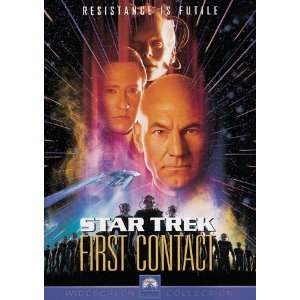 Having just rewatched the film for the first time in years, I can still see every reason why I disliked it to begin with. It stands as a distillation of everything that is wrong with the TNG films. It has it’s “cutesy” moments which drip with “hey look at us” desperation, it flies in the face of continuity and in the end doesn’t feel even remotely epic.
Having just rewatched the film for the first time in years, I can still see every reason why I disliked it to begin with. It stands as a distillation of everything that is wrong with the TNG films. It has it’s “cutesy” moments which drip with “hey look at us” desperation, it flies in the face of continuity and in the end doesn’t feel even remotely epic.
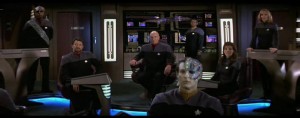 Part of the problem stems from the fact that after 7 years, it’s hard to imagine that there’s much in the way of unmined territory to take these characters to. Whereas the original series was cut after only 3 years, it left the audience CLAMORING for more stories with that crew (even if it meant a short-lived animated series). The TNG films started just after the series went off the air, leaving no time for the audience to mourn the loss.
Part of the problem stems from the fact that after 7 years, it’s hard to imagine that there’s much in the way of unmined territory to take these characters to. Whereas the original series was cut after only 3 years, it left the audience CLAMORING for more stories with that crew (even if it meant a short-lived animated series). The TNG films started just after the series went off the air, leaving no time for the audience to mourn the loss.
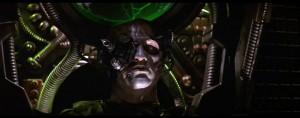 But there’s a lot more to it than that. First Contact, of all the TNG films, had the greatest potential for success. It brought back the series’ most frightening villains (The Borg), it harkened back to Star Trek IV‘s successful fish-out-of-water scenario, and it even brought back Jerry Goldsmith to perform his original Star Trek movie theme.
But there’s a lot more to it than that. First Contact, of all the TNG films, had the greatest potential for success. It brought back the series’ most frightening villains (The Borg), it harkened back to Star Trek IV‘s successful fish-out-of-water scenario, and it even brought back Jerry Goldsmith to perform his original Star Trek movie theme.
And yet, despite all this, we’re saddled with a film that misfires at every turn.
Continuity? Well after the minor misstep in Generations where Scotty witnesses Kirk’s death (only to, 70 years later, insist that Kirk led the party to find him himself), First Contact ups the ante by introducing us to a character we’ve met before, getting the details a bit off.
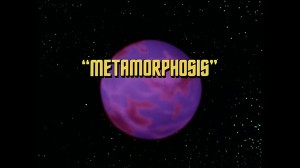 We first met Zephram Cochrane in the TOS episode “Metamorphosis” where Kirk, Spock and McCoy are hijacked by an alien entity and forced to land on a planetoid. There they meet Cochrane who has been kept alive all these years by the alien.
We first met Zephram Cochrane in the TOS episode “Metamorphosis” where Kirk, Spock and McCoy are hijacked by an alien entity and forced to land on a planetoid. There they meet Cochrane who has been kept alive all these years by the alien.  Kirk’s exclamation when he finds out who he’s talking to goes something like this, “Zephram Cochrane? Of Alpha Centauri? The inventor of the space warp?” That line alone should mean that the man comes from Alpha Centauri which would mean that “first contact” already happened, and so forth.
Kirk’s exclamation when he finds out who he’s talking to goes something like this, “Zephram Cochrane? Of Alpha Centauri? The inventor of the space warp?” That line alone should mean that the man comes from Alpha Centauri which would mean that “first contact” already happened, and so forth. 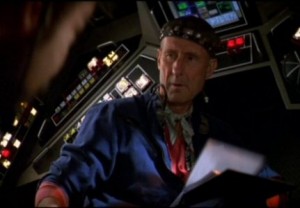 That said, the man we met in the original series bears little resemblance either physically or personality-wise to the man we met in the film. If you really want more info on this particular gaff, Memory Alpha has a long thread on it here.
That said, the man we met in the original series bears little resemblance either physically or personality-wise to the man we met in the film. If you really want more info on this particular gaff, Memory Alpha has a long thread on it here.
But let’s move on past continuity to shoddy writing. How about the idea that not only does Captain Jean Luc Picard have a catchphase, not only is the crew aware of the catchphrase, but it’s also a single and often-used word? As the Phoenix is getting ready to jump to warp, Cochrane gives the “order” to go to warp uttering the classic line, “engage”! How do I know it’s a ‘classic’ line?
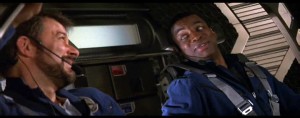
HE SAID IT!!!
Because as soon as the word comes from his lips, Riker and LaForge give each other a knowing smile reminiscent of Peter Griffen’s when someone says the name of the movie IN the movie?
And about that… After the crew reveals themselves to Cochrane, the man asks the inexplicable question, “so you’re all astronauts… on some kind of star trek?” Are you kidding me? Who the Hell talks like that? Of course, this line was SO well regarded that it was included in the theatrical trailer. I can’t count the number of times I slapped my own head when hearing this.
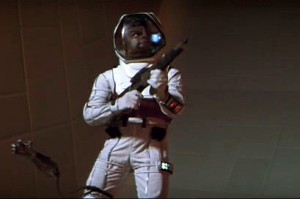 Data’s “to hell with our orders” and Worf’s “assimilate this” were more character moments that we could have lived without. They probably weren’t as grating to most as they were to me, but that was ONLY because they were encased in the inanity that was the rest of the film.
Data’s “to hell with our orders” and Worf’s “assimilate this” were more character moments that we could have lived without. They probably weren’t as grating to most as they were to me, but that was ONLY because they were encased in the inanity that was the rest of the film.
After all the time travelling that our two crews had done to this point, did ANYONE stop to think what a horrible idea it would be to give Zephram Cochrane such INTIMATE knowledge of the future (his name on a high school, a giant statue, etc.)? Every single character was falling over him/herself to tell him what was going to happen. And they did it with such glee!
ALL of this, and more, was so grating on me that I almost missed what the film was trying to do (whether intentionally or not). First Contact attempted to do what the original series had done so well, which was to give us hope for the future.
The original Star Trek came on the air as nuclear tensions rose, civil rights protests took the headlines and the threat of war loomed. Star Trek showed us that we could survive all that. It told us that we WOULD survive all that and that the world would be a better place as we took our place amongst the stars.
It was a part of continuity going back to the days of the original series that a third world war would be unleashed upon the Earth and that things would get a bit worse before they got better, but that they WOULD get better. First Contact takes place after that point as the world is putting itself slowly back together.
As such, it situates itself PERFECTLY for getting back to that original sense of hopefulness. It shows a world where we have indeed suffered. And it shows us picking ourselves up, dusting ourselves off, getting back in touch with the frontier spirit and inventive nature and building our hope for the future. As messages go, it’s a strong one and it’s a good one.
Unfortunately it gets undercut by half the film. Picard’s assertion that they don’t do anything for money in the future is a bit disingenuous. They use money in the future. They have to. And they value it. If they didn’t, Quark wouldn’t make any money off the Starfleet crew on Deep Space Nine. I believe that this bit of writing stems from the claim that Admiral Kirk makes in Star Trek IV. In one scene he is sitting down for dinner with Dr. Gillian Taylor at a pizza place. Suddenly he feels they have to leave. 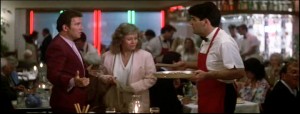 As the bill comes, she asks Kirk ‘I suppose they don’t use money in the 23rd century?’ to which he replies, ‘well we don’t.’ I feel like the writers in First Contact took this a little too literally. The implication that I got was that they didn’t use any kind of currency that Kirk could use in the 20th century (besides, he didn’t even have any on him). Maybe they use credit (as had been speculated it FASA’s Starfleet Technical Manual in the late 80’s). Besides, without money, why would Kirk say to Scotty in “The Doomsday Machine”, “Scotty… you just earned your pay for the week.” Or how about in “The Trouble with Tribbles” when Uhura tries to buy a tribble? What was she going to use? Her smile?
As the bill comes, she asks Kirk ‘I suppose they don’t use money in the 23rd century?’ to which he replies, ‘well we don’t.’ I feel like the writers in First Contact took this a little too literally. The implication that I got was that they didn’t use any kind of currency that Kirk could use in the 20th century (besides, he didn’t even have any on him). Maybe they use credit (as had been speculated it FASA’s Starfleet Technical Manual in the late 80’s). Besides, without money, why would Kirk say to Scotty in “The Doomsday Machine”, “Scotty… you just earned your pay for the week.” Or how about in “The Trouble with Tribbles” when Uhura tries to buy a tribble? What was she going to use? Her smile?
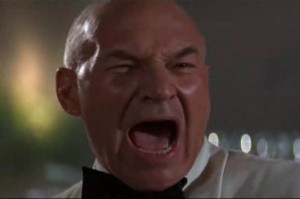 Plus, I understand that the idea that Picard is espousing such moral platitudes is supposed to serve to make his eventual acts of vengeance that much more jarring, but I find them patently unnecessary.
Plus, I understand that the idea that Picard is espousing such moral platitudes is supposed to serve to make his eventual acts of vengeance that much more jarring, but I find them patently unnecessary. 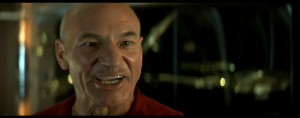 The character of… well, the character should speak for itself. Such vengeful actions are VERY much unlike the Picard we know. That, in and of itself, should be what makes it jarring.
The character of… well, the character should speak for itself. Such vengeful actions are VERY much unlike the Picard we know. That, in and of itself, should be what makes it jarring.
This film SHOULD have been a better film than it was. It got bogged down by all the saccharine crap that plagued The Next Generation in its later years. It tried too hard to manufacture moments for the characters instead of just making a good story. The first 6 Star Trek films ran the gambit from GREAT to mediocre to downright terrible. If you watched them, you got a good blueprint for what works and what doesn’t in a Star Trek film. How the production teams were able to make 4 films AFTER those that couldn’t get it even close to right is BEYOND me and almost downright criminal.
For the record, the cast is pretty much blameless here (except, possibly, for Jonathan Frakes who DID direct two of these films).